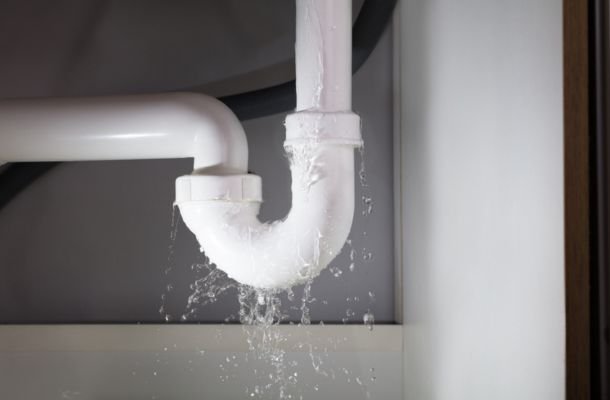Water damage is a frequent and costly problem for homeowners, often leading to extensive repairs, mold growth, and loss of valuable possessions. Understanding the common causes of water damage and taking proactive steps to prevent them can help protect your home. This guide outlines ten common causes of water damage and provides practical tips on how to prevent each one.

1. Burst Pipes
Causes
Burst pipes can occur due to freezing temperatures, high water pressure, or corrosion. Pipes can freeze in unheated areas like basements, attics, or exterior walls, expanding and eventually bursting as the ice thaws.
Prevention Tips
- Insulate Pipes: Use pipe insulation, especially in areas exposed to cold weather.
- Maintain a Consistent Temperature: Keep your home heated during cold weather, even when you’re away.
- Monitor Water Pressure: Use a pressure gauge to ensure your water pressure is within safe limits (typically 40-60 psi).
- Regular Inspections: Check pipes regularly for signs of wear or leaks, and replace any that are corroded or damaged.
2. Leaky Roof
Causes
Leaky roofs can be caused by missing or damaged shingles, clogged gutters, or worn flashing around chimneys and vents. These leaks allow water to seep into the attic and ceiling, leading to structural damage and mold growth.
Prevention Tips
- Inspect the Roof Regularly: Check for missing or damaged shingles, especially after storms.
- Clean Gutters: Keep gutters and downspouts free of debris to prevent water from pooling on the roof.
- Repair Flashing: Ensure flashing around chimneys, skylights, and vents is properly sealed and in good condition.
- Trim Overhanging Branches: Prevent branches from damaging your roof during high winds or heavy snow.
3. Faulty Appliances
Causes
Appliances like washing machines, dishwashers, and water heaters can cause water damage if they malfunction. Common issues include broken hoses, leaks, or overflows due to age, improper installation, or wear and tear.
Prevention Tips
- Regular Maintenance: Check appliance hoses and connections for signs of wear or leaks.
- Replace Old Hoses: Replace rubber hoses with braided stainless steel ones, which are more durable.
- Install Water Alarms: Place water alarms near appliances to detect leaks early.
- Upgrade Appliances: Consider replacing old appliances with newer models that have built-in flood prevention features.
4. Clogged Gutters and Downspouts
Causes
Clogged gutters and downspouts prevent water from draining away from the house, causing it to overflow and pool around the foundation. This can lead to basement flooding and water damage to walls and foundations.
Prevention Tips
- Regular Cleaning: Clean gutters and downspouts at least twice a year, or more often if you have overhanging trees.
- Install Gutter Guards: Gutter guards can help keep debris out and reduce the frequency of clogs.
- Ensure Proper Downspout Placement: Make sure downspouts extend at least 6 feet away from your foundation.
5. Poor Drainage
Causes
Improper drainage can cause water to pool around your home’s foundation, leading to leaks, basement flooding, and structural damage. This can result from poor yard grading, blocked drains, or inadequate exterior drainage systems.
Prevention Tips
- Grade the Yard: Ensure your yard slopes away from the foundation to direct water away from the house.
- Maintain Drainage Systems: Keep exterior drains clear of debris and ensure they function properly.
- Install a French Drain: A French drain can help redirect water away from areas prone to pooling.
6. Sump Pump Failures
Causes
Sump pump failures can occur due to power outages, mechanical failures, or clogged discharge lines. Without a functioning sump pump, water can quickly accumulate in your basement during heavy rain or flooding.
Prevention Tips
- Regular Testing: Test your sump pump every few months and before the rainy season to ensure it’s working properly.
- Install a Battery Backup: A battery backup ensures the sump pump continues to work during power outages.
- Keep the Discharge Line Clear: Ensure the discharge line is free of obstructions and directs water away from the foundation.
7. Foundation Cracks
Causes
Foundation cracks can develop due to settling, poor construction, or water pressure from the surrounding soil. These cracks provide a pathway for water to enter your basement or crawl space.
Prevention Tips
- Seal Cracks: Use epoxy or polyurethane sealants to fill and seal any cracks in your foundation.
- Control Water Around Foundation: Use proper grading, gutters, and downspouts to keep water away from the foundation.
- Install a French Drain or Waterproofing Membrane: These systems can help manage groundwater around the foundation.
8. Sewer Backups
Causes
Sewer backups occur when the municipal sewer system or septic tank becomes overloaded or blocked, causing wastewater to back up into your home. This can be caused by heavy rains, tree roots, or blockages in the sewer line.
Prevention Tips
- Install a Backwater Valve: A backwater valve prevents sewage from backing up into your home during overload conditions.
- Avoid Flushing Inappropriate Items: Only flush toilet paper and human waste; avoid disposing of grease, wipes, or other items that can clog pipes.
- Regular Sewer Line Maintenance: Have your sewer lines inspected and cleaned periodically to prevent blockages.

9. HVAC System Issues
Causes
HVAC systems, particularly air conditioning units, can cause water damage if their drainage systems become clogged or if there is a leak in the condensate line. Excess humidity or improper maintenance can also contribute to water issues.
Prevention Tips
- Regular Maintenance: Schedule annual maintenance for your HVAC system, including checking and cleaning the condensate lines.
- Replace Air Filters: Regularly replace air filters to keep the system running efficiently and prevent excessive moisture buildup.
- Install a Condensate Pump: If your HVAC system is in a basement or attic, a condensate pump can help remove excess water safely.
10. Extreme Weather Events
Causes
Extreme weather events, such as hurricanes, flash floods, and intense storms, can cause significant water damage through heavy rainfall, high winds, and storm surges. Homes in flood-prone areas are particularly at risk.
Prevention Tips
- Prepare for Storms: Install storm shutters, reinforce doors and windows, and keep sandbags on hand if you live in a flood-prone area.
- Floodproof Your Home: Consider installing flood barriers, sump pumps, and backwater valves.
- Maintain Insurance Coverage: Ensure you have adequate homeowners or flood insurance to cover potential damage.
Conclusion
Water damage can be a devastating event for homeowners, but understanding the common causes and taking preventative measures can significantly reduce the risk. By maintaining your home’s plumbing, drainage, and waterproofing systems, and by preparing for extreme weather events, you can protect your home from the costly impacts of water damage. Regular inspections, timely maintenance, and the installation of key preventative measures will help keep your home dry and safe from water-related issues.

